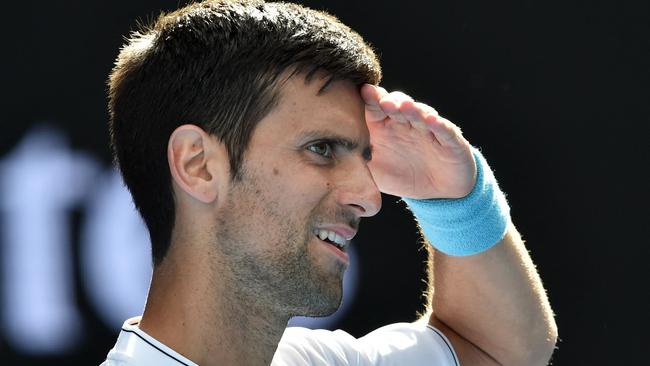Novak Djokovic court hearing analysis: Critical details in judge’s decision
Novak Djokovic didn’t technically win his visa case – he instead forced an absolute capitulation.
Tennis
Don't miss out on the headlines from Tennis. Followed categories will be added to My News.
Novak Djokovic forced another absolute capitulation on Monday.
This time it wasn’t a lowly ranked tennis player he beat 6-0, 6-0. It was the Australian government.
The Minister for Home Affairs consented to the Federal Circuit Court making orders quashing the decision to cancel Djokovic’s visa. They also agreed to pay Djokovic’s costs.
To be more accurate, the government agreed to you and me – as taxpayers – paying Djokovic’s costs.
Djokovic didn’t technically win his case – he just forced the government to throw in the towel in a dramatic retreat. In some ways, forcing your opponent to yield to you and surrender is better than a win. Djokovic almost always wins on court, and now he’s winning in court.
RECAP HOW THE MASSIVE DECISION PLAYED OUT
In doing so, Djokovic has – for another year – ensured the world’s eyes are watching Melbourne, Australia in January. But this year it’s for all the wrong reasons.
Rather than making Australia look like a place you’d like to visit and a place that knows how to put on a show and a sporting event, we look like a pack of idiots who couldn’t run a meat raffle in an RSL.

Point the finger wherever you like – Djokovic himself, the federal government, the Victorian government or Tennis Australia – it doesn’t matter. The fact is, today Australia is an international laughing stock.
The legal case has been playing out since Djokovic had his visa cancelled by the Commonwealth government through Australian Border Force officials at the airport last Thursday and came to an end in dramatic circumstances late on Monday with the government hoisting the white flag.
With a clearly annoyed Judge Anthony Kelly, the government not only agreed to Djokovic’s visa being reinstated, they agreed to the Court finding the process that the government – through Border Force – engaged in was unreasonable (and therefore invalid) in that they didn’t dot the “I”s and cross the “T”s as the saying goes.
In a legal case, not only agreeing to orders and costs against you, but agreeing to findings you acted inappropriately is like agreeing to have your nose rubbed in it.
The big question is now whether the government would try to revisit the visa cancellation, but with a proper process that saw them dot the “I”s and cross the “T”s.
On one view that was possible the capitulation was a strategic one. There’s a saying in the law about “taking the temperature of the bench”. The bench is where the judge sits, and so this refers to trying to guess from the judge’s comments or demeanour which way they’re leaning.
Taking the temperature of the bench on Monday told me his Honour was red hot in favour of finding for Djokovic.
Not only did his Honour seem to think the process was unreasonable – as the government agreed to his Honour including in the court orders made by consent – but his Honour appears to be have had a tentative view in favour of Djokovic on a far more important point.

Earlier in the hearing – when the live feed was not active – his Honour said he found it difficult to understand how Djokovic’s medical exemption – based on his December positive test and signed by a professor of immunology, a physician with expertise in disease and endorsed by a state government independent panel – was rejected by Border Force.
A finding by his Honour that Djokovic was medically exempt would have tied the government’s hands going forward. The government’s lawyers would have known his Honour was likely leaning against them. So it is possible they surrendered in order to limit the loss they were about to suffer by agreeing to essentially start the whole process again.
That wouldn’t have been the silliest of moves given where they were at lunch on Day 1 – which was worse off than the Poms have been in most of the tests this summer.
So the big question at the end of Monday’s hearing was what would the government do next?
That’s a question that would likely have been decided – by focus groups. I’ll leave it up to the political reporters and commentators to pass judgment on the government’s decision making because the decision whether to again try to cancel Djokovic’s visa is a purely political one and not a legal one.
The court was told just after the case was essentially over that the government was still considering this.
The judge seemed unimpressed – although thankful he had been told and not blindsided later. The powers to cancel visas are wide, including if the minister considers it is in the public interest.
Even while Djokovic was in detention he was the favourite to win the Australian Open.
After Monday night’s court drama he would have been even shorter odds. If he wins, it will be some story.
Justin Quill is a partner with major law firm Thomson Geer, which acts for the Herald Sun




